
New name but old tradition: Intermittent fasting
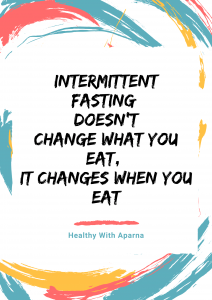 Intermittent fasting is not a diet, it’s a pattern of eating. It’s a way of scheduling your meals so that you get the most out of them. Intermittent fasting doesn’t change what you eat, it changes when you eat.
Intermittent fasting is not a diet, it’s a pattern of eating. It’s a way of scheduling your meals so that you get the most out of them. Intermittent fasting doesn’t change what you eat, it changes when you eat.
But there is nothing “new” about fasting. In fact, Intermittent fasting might actually be an ancient secret of health. It is ancient because it has been practiced throughout all of human history.
It’s very important to understand the correct way of doing fasting and also how we need to eat during feasting window.
There are two stages of Intermittent fasting – Fed state & Fasting State
Your body is in the fed state when it is digesting and absorbing food. Typically, the fed state starts when you begin eating and lasts for three to five hours as your body digests and absorbs the food you just ate. When you are in the fed state, it’s very hard for your body to burn fat because your insulin levels are high.
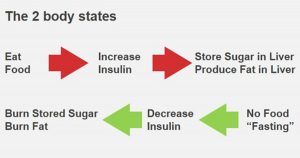
Insulin rises when we eat, helping to store the excess energy in two separate ways. Carbohydrates are broken down into individual glucose (sugar) units, which can be linked into long chains to form glycogen, which is then stored in the liver or muscle.
When you fast, several things happen in your body on the cellular and molecular level.
For example, your body adjusts hormone levels to make stored body fat more accessible.
Your cells also initiate important repair processes and change the expression of genes.
Here are some changes that occur in your body when you fast:
- Human Growth Hormone (HGH): The levels of growth hormone skyrocket, increasing as much as 5-fold. This has benefits for fat loss and muscle gain.
- Insulin: Insulin sensitivity improves and levels of insulin drop dramatically. Lower insulin levels make stored body fat more accessible
- Cellular repair: When fasted, your cells initiate cellular repair processes. This includes autophagy, where cells digest and remove old and dysfunctional proteins that build up inside cells.
- Gene expression: There are changes in the function of genes related to longevity and protection against disease.
These changes in hormone levels, cell function and gene expression are responsible for the health benefits of intermittent fasting.
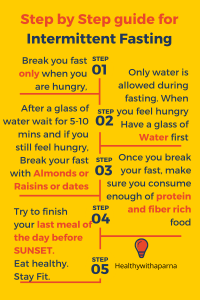 After that time span, your body goes into what is known as the post-absorptive state, which is just a fancy way of saying that your body isn’t processing a meal. The post-absorptive state lasts until 8 to 12 hours after your last meal, which is when you enter the fasted state. It is much easier for you body to burn fat in the fasted state because your insulin levels are low.
After that time span, your body goes into what is known as the post-absorptive state, which is just a fancy way of saying that your body isn’t processing a meal. The post-absorptive state lasts until 8 to 12 hours after your last meal, which is when you enter the fasted state. It is much easier for you body to burn fat in the fasted state because your insulin levels are low.
The process goes in reverse when we do not eat (intermittent fasting). Insulin levels fall, signaling the body to start burning stored energy as no more is coming through food. Blood glucose falls, so the body must now pull glucose out of storage to burn for energy.
Some popular methods of Intermittent Fasting are :
- The 16/8 Method: Fast for 16 hours each day.
- The 5:2 diet: Fast for 2 days per week.
- Eat-Stop-Eat: Do a 24-hour fast, once or twice a week.
- Alternate-day fasting: Fast every other day.
Checkout my video for more details Click here
Although there are many different ways to do intermittent fasting, and there is no single plan that will work for everyone. Individuals will experience the best results if they try out the various styles to see what suits their lifestyle and preferences.
NOTE : Regardless of the type of intermittent fasting, fasting for extended periods when the body is unprepared can be problematic.These forms of dieting may not be suitable for everyone. If a person is prone to disordered eating, these approaches may exacerbate their unhealthy relationship with food.People with health conditions, including diabetes, should speak to a doctor before attempting any form of fasting.
For the best results, it is essential to eat a healthy and balanced diet on non-fasting days. If necessary, a person can seek professional help to personalize an intermittent fasting plan and avoid pitfalls.
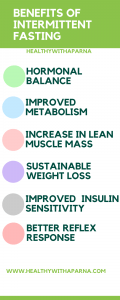 There are many Benefits of Intermittent Fasting :
There are many Benefits of Intermittent Fasting :
- Sustainable weight loss
- An increase in lean muscle mass
- Hormonal balance
- More energy
- An increase in cell stress response
- A reduction in oxidative stress and inflammation
- Improved insulin sensitivity
- Increased production of neurotrophic growth factor.
Intermittent fasting helps you eat fewer calories, while boosting metabolism slightly. It is a very effective tool to lose weight and belly fat.It also helps in reducing oxidative damage and inflammation in the body. This should have benefits against aging and development of numerous diseases. It also improve numerous risk factors for heart disease such as blood pressure, cholesterol levels, triglycerides and inflammatory markers.
Things you must know, if you are planning to incorporate this healthy habit in your daily routine. Understand that every body is unique and there are only two rules for intermittent fasting which we need to be careful is :
- Only water is allowed in fasting state.
- Eat healthy food which are rich in protein and fiber in your feasting (eating) state.
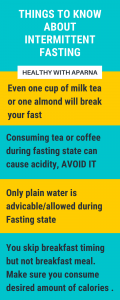
You must do it as per your body, if you feel hungry go ahead and break the fast in 12 hrs or 14 hrs or even 10 hrs, do it as per your body not as per rule book.
In fasting state if possible avoid tea or coffee as they are caffinated drinks and acidic in nature, it can result in bloating, acidity or stomach discomfort.
First few days , you may feel dizziness, weakness but after 3 days of successful intermittent fasting, you will obeserve elevated energy level and also improvement in your response time. In intermittent fasting you don’t STARVE, you never miss out meals, you just combine two meals together (such as breakfast and lunch) but still you have to consume the defined amout on calories in a day. To achieve positive outcome of Intermittent fasting, you have to avoid sugary or processed food.
Stay Motivated!
Stay Fit!
Fast Daily!
Our body is capable of its own detox and rejuvenation, its just need time, proper routine and healthy fuel inform of food.

Leave a Reply